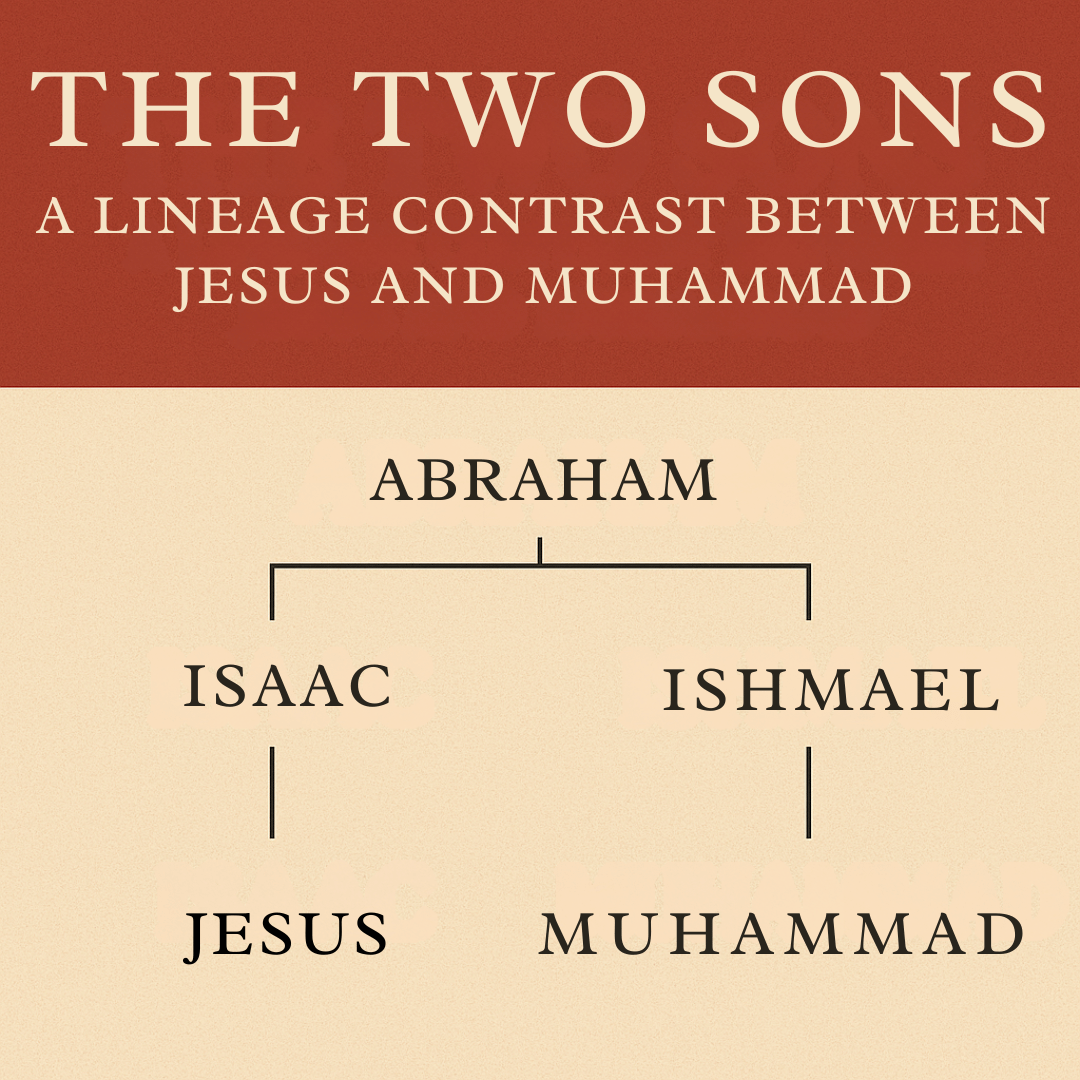
The Two Sons: A Clear Lineage Contrast Between Jesus and Muhammad
Share
Porch Talk with American Nana — plain truth, Bible open.
From Abraham’s household came two sons and two very different legacies. The Bible doesn’t leave us guessing: God’s everlasting covenant runs through Isaac and reaches its fulfillment in Jesus Christ. Ishmael was blessed with nationhood—yes—but the covenant line of redemption did not pass through him. (See Genesis 17:19–21; Galatians 3:16)
1) Where the Promise Starts: Abraham
| Son | Mother | Covenant Status | Scripture |
|---|---|---|---|
| Isaac | Sarah (wife) (free woman) | Child of promise; covenant confirmed through him | Genesis 17:19–21; 21 |
| Ishmael | Hagar (bondwoman) | Blessed with a great nation; not the covenant line | Genesis 16–17; 21:12–21 |
God kept His word to both boys—promise to Isaac, multiplication to Ishmael. Different gifts. Different purposes. One faithful God.
2) Isaac’s Line → Jesus the Messiah
The covenant thread runs: Abraham → Isaac → Jacob (Israel) → Judah → David → Mary → Jesus.
- Jacob becomes Israel; the twelve tribes arise (Genesis 28–35).
- Judah carries the scepter (Genesis 49:10).
- David’s house receives the royal promise (2 Samuel 7; Isaiah 9:6–7).
- Jesus fulfills the prophecies—born of a virgin, Son of God, crucified and risen (Matthew 1; Luke 1–2; 1 Corinthians 15:3–4).
“No one comes to the Father except through Me.” — John 14:6
3) Ishmael’s Line → Muhammad (Historical/Traditional)
Arab genealogies trace Ishmael’s descendants through Adnan to the tribe of Quraysh in Mecca, culminating in Muhammad ibn ‘Abd Allah (ca. A.D. 570). This is a historical and cultural lineage—not the biblical covenant line of redemption. (Genesis 21:20–21)
4) Covenant vs. Nationhood: What’s the Difference?
| Theme | Through Isaac → Jesus | Through Ishmael → Muhammad |
|---|---|---|
| Nature of Promise | Eternal covenant leading to salvation in Christ (Genesis 17:19; Galatians 3:16) | Blessing of multiplication and nationhood (Genesis 17:20) |
| Culmination | Messiah, Son of God, crucified and risen | Prophet of Islam; submission to Allah |
| Core Focus | Grace, redemption, relationship with the Father | Law, obedience, communal submission |
| Central Text | The Bible (OT/NT), textually verified (e.g., Dead Sea Scrolls) | The Qur’an (7th century A.D., Arabic composition) |
| View of Jesus | Divine Son of God; Savior | Respected prophet; not divine; crucifixion denied (Qur’an 4:157–158) |
5) Scripture’s Own Commentary on the Two Lines
Paul interprets the household drama in spiritual terms:
“The son of the slave woman was born according to the flesh, but the son of the free woman through promise.” — Galatians 4:22–31
Bottom line: the inheritance we’re after is not DNA—it’s the promise fulfilled in Christ.
6) Why This Matters Today
- Clarity without cruelty: We can love our neighbors and still tell the truth about covenant and Christ.
- Confidence in Scripture: God’s Word holds up under history and manuscript evidence.
- Call to faith: Salvation is by grace through faith in Jesus alone (Ephesians 2:8–9).
Be God-fearing—the God of the Bible. The promise stands. The Messiah has come. Choose the line of life.